Loch Ness Monster: Is Nessie just a tourist conspiracy?
- Published
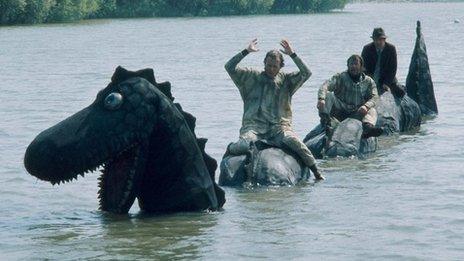
It is 80 years since hotel manageress Mrs Aldie Mackay first reported seeing a "whale-like fish" in the waters of Loch Ness.
Now an academic at St Andrew's University is trawling through 1,000 eye-witness accounts since to see what they can tell us.
He wryly notes more than a few hotel proprietors among typical spotters. So is "Nessie" just a conspiracy to boost tourism?
It was 14 April 1933 and Mrs Mackay, manageress of the Drumnadrochit Hotel, was driving with her husband along the road to Inverness.
As they drove, she glanced out across the still calm waters of Loch Ness towards Aldourie Castle. There, in the water, she saw something.
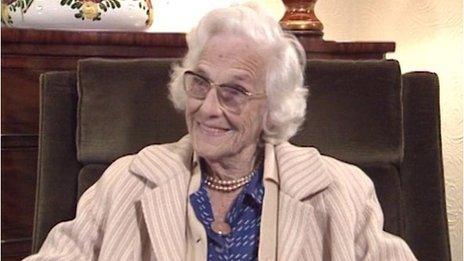
Mrs Aldie Mackay, manageress of the Drumnadrochit Hotel, said she saw a "beast" in the loch on 14 April, 1933
In a rare interview years later, she described the moment to marine biologist and founder of The Loch Ness Project, Adrian Shine.
"She said it was black, wet, with the water rolling off it," he says.
"It went in a circle, round and down. She yelled at her husband "Stop! The beast!"
It is an interesting remark, Mr Shine says.
Mrs Mackay's sighting was reported in the Inverness Courier on 2 May 1933 by Alex Campbell, the water bailiff for Loch Ness and a part-time journalist.
It is widely regarded as the first "modern sighting" of a monster in the loch.
"But the fact that she said "the beast"... It's as though she knew there was something strange in the loch," Mr Shine says.
Local legend
There was already one account of a monster in the area dating back to the Middle Ages.
According to Adamnan's account of the life of Saint Columba, believed to have been written in the 7th century, the Irish monk saw a "water beast" in the River Ness.
But Mrs Mackay's sighting opened the floodgates.
Police inspectors, bank managers, students, town clerks, lorry drivers, clergymen, forestry workers, office workers, water bailiffs and fishermen were all among the people who claimed to have seen the monster.
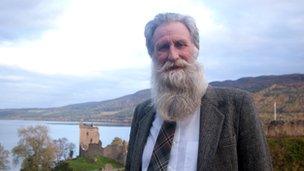
Marine biologist Adrian Shine says he has made a living out of being a sceptical Loch Ness investigator
Tourists and 'Nessie hunters' flocked to the area. There were traffic jams around the loch.
There were even a few celebrity spotters such as authors Gavin Maxwell and Sir Compton Mackenzie.
Dr Charles Paxton, a research fellow and statistical ecologist at St Andrew's University, has so far sifted through 800 of the 1,000 recorded sightings.
And, he adds, a sizeable number came from cafe and hotel proprietors, including Mrs Mackay herself.
Certainly there was much to be gained from the legend.
According to Visit Scotland, Nessie tourism brings in more than £1m to the area per year.
So was Mrs Mackay motivated by cynical thoughts of her bank balance?
Mr Shine believes not.
"She was far from a self-publicist. It was her husband who told the water bailiff, and she stayed anonymous in the newspaper report.
"She didn't say anything for two reasons. Firstly, because she thought she would be seen as self-advertising.
"But also because they used to say for people who had seen something in the loch "take more water with it"… suggesting they were drunks."
But there are plenty of people who have made a living from Nessie, including Mr Shine himself, who now runs the Loch Ness Centre and Exhibition out of Mrs Mackay's old hotel.
Fame and fortune
"I don't conceal that I first came seeking fame and fortune, that there was a wildlife mystery and I was the one to solve it," he says.
"I have become more sceptical over the years, but oddly enough I have made a living out of being a fairly sceptical investigator.
"But I do believe the vast majority of witnesses are sincere…and not drunk," he adds.
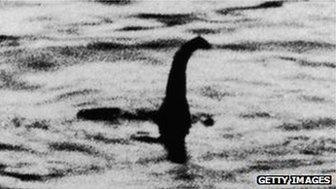
British surgeon Colonel Robert Wilson claimed he took this photograph on 19 April 1934
What does Dr Paxton - who is using the Loch Ness phenomenon to analyse how science handles anecdotal and low frequency data - think?
He has trawled through old newspaper clippings, reports, books and records from the Loch Ness Investigation Bureau of the 1960s and 1970s, for all recorded sightings that peaked especially after the infamous 'surgeon's photograph' of 1934.
Highly respected British surgeon, Colonel Robert Wilson, claimed he took his photograph on 19 April 1934, while driving along the northern shore of Loch Ness. It was later revealed to be a toy submarine outfitted with a sea-serpent head.
"I suppose it is possible that people have an agenda," Dr Paxton says.
"But I stress that I believe the vast majority of people are reporting the truth. They believe they have seen something strange.
"Now there might be a lot of people who are mistaken, but I think they are sincere."
In fact, Dr Paxton says, analysing the eye-witness accounts may tell us more about ourselves than whether or not the Loch Ness monster exists. He is due to publish the results of his study later this year.
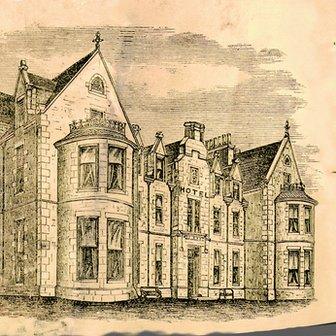
The Drumnadrochit Hotel, which is now the Loch Ness Centre
"I am carrying out a statistical analysis of Loch Ness monster accounts since 1933, specifically looking for clusters in terms of what is reported," he says.
"In some cases there are multiple witnesses, or witnesses giving multiple accounts of the same event, which allow us to test eyewitness consistency.
"These cases are very interesting because they allow us to consider whether certain witnesses have a tendency to see Nessie more than might be expected by chance alone."
He could have chosen another unexplained phenomenon to analyse - ghost sightings or Big Foot, for example - but as a former aquatic biologist, Nessie appealed to him.
On Sunday, a boat will set sail onto the still calm waters of Loch Ness.
Onboard will be Dr Paxton, Mr Shine, and a number of other 'monster hunters', Loch Ness experts, and Visit Scotland representatives.
They may not agree when it comes to Nessie, but there on the loch they will raise a glass of whisky to Mrs Mackay and 80 years of the legend of Loch Ness.
- Published4 March 2013
- Published25 February 2013
- Published11 October 2012